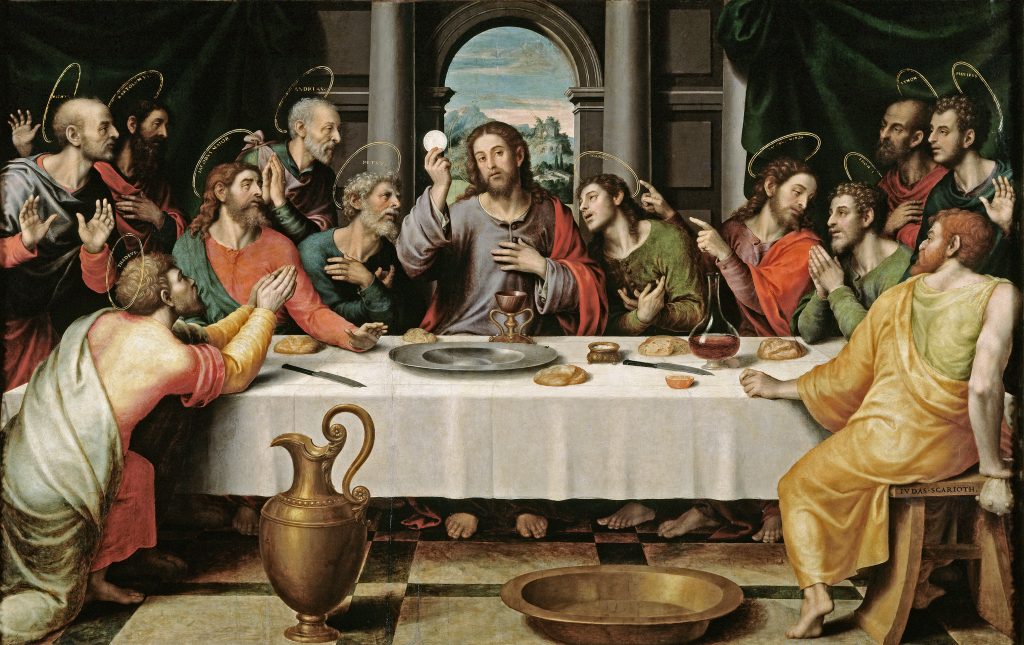
Lesson Objectives
- To learn the "big-picture" overview of the Bible - the story that the Bible tells.
- To understand the concept of "covenant" and its importance for reading and interpreting the Bible.
- To learn in general detail the six major covenants in the Bible.
II. What is a Covenant?
A. The Difference Between Covenants and Contracts
Ok. We've established that covenant is a key, if not the key to reading and understanding the Bible. It's also the central concept we need in order to understand and live the realities the Bible reveals to us and the Church brings to us in the sacraments.
But what's a covenant?
Let's start with the word. Covenant comes from the Latin word, convenire ("to come together" or "to agree").
Today, we use the word "covenant" almost interchangeably with the word "contract."
But that's very misleading when we try to compare our notion of contract with the biblical notions of "covenant" expressed by the Hebrew word berith and the Greek word diatheke.
The difference between covenant and contract in the Old Testament and throughout the Bible is profound. It's so profound that we could almost say that it's the difference between prostitution (contract) and marriage (covenant). Or between owning a slave (contract) and having a son (covenant.)
There are two big differences between our notion of contract and the biblical notion of covenant.
First, contracts involve promises, covenants involve oaths.
When you enter into a contract, say, to buy a house, you make a promise to the seller, along the lines of: "I give you my word that I will pay you this amount of money for your house." The seller , in turn, makes a promise: "I give you my word that if you pay me the sum we have agreed upon, I will turn over to you the deed to my house."
The "word" you each pledge to the other is your name. And you each sign your name on the contract as a "sign" that you'll uphold your end of the bargain or keep your promise.
Covenants are much different. In a covenant, you elevate and upgrade your promise. Not only do you give your word, you also swear an oath, invoke a higher authority - you call God in as your witness.
Think of the oath we're most familiar with, the oath you swear before taking the witness stand in a courtroom: "I promise to tell the whole truth and nothing but the truth, so help me God."
You've promised, given your word to tell the truth. You've also asked God to help you keep your promise. It's not only you and the judge now. It's you, the judge and God. Now, if you lie under oath, you're not only liable to go to jail, you're liable to be punished by God. The flip side of asking for God's help in an oath is surrendering yourself to God's judgment. You say, in effect, "I'll be damned if I don't tell the truth."
In the old days, we used to have politicians swear on the Bible and the Bible would be opened to the Book of Deuteronomy, Chapter 28, where the blessings and the curses are recorded. We were asking them to swear to uphold the constitution or suffer the curses recorded in those pages.
Even in our highly secularized society, we retain elements of this older understanding of oaths. We make doctors, police officers, military personnel and public officials swear oaths. Why? Because we depend on them; we literally put our lives in their hands. We want them to swear to God that they'll do their jobs. We can't just take their word for it, we want them to know that they'll have to answer to a higher authority.
Incidentally, did you know that the word "oath" translates the Latin word sacramentum,where we get our word "sacrament"? In a future course, we'll look at sacraments as oaths. But for now, just keep in mind, as we mentioned earlier, that the notion of covenant and oaths is crucial to understanding the sacraments and our relationship with God.
The second big difference between contracts and covenants is this: contracts exchange property, covenants exchange persons.
Contracts involve you promising to pay a certain sum of money and the person you're contracting with to deliver you a certain product or service.
Covenants are much different. When people enter into a covenant, they say: "I am yours and you are mine." In a contract, you exchange something you have - a skill, a piece of property, money. In a covenant you exchange your very being, you give your very self to another person.
Marriage is a covenant. The man swears an oath to the woman, "I'm yours forever." The woman swears an oath to the man, "I'm yours forever."
B. The Meaning of Covenant in the Bible
Now we're ready to see how covenants function in the Bible.
We have examples of covenant-making throughout the ancient world. And there are some similarities between the kinds of covenants that, for instance, the ancient Hittites and others made and the covenants we find in the Bible.
You'll find for instance, that ancient covenants take a certain form: There's a kind of preamble that introduces the covenant, followed by a historical review of the relationship between the two parties; then a series of stipulations that spell out the obligations of the parties, along with a list of blessings and curses for upholding or breaking the covenant. Usually, the covenant is "ratified" in a solemn ceremony that involves a reading of the covenant document and eating and drinking. (If you want a very detailed analysis, try "The Meaning of Covenant" in the SalvationHistory.com Scripture Library.)
We want to focus here, not so much on how covenants are made, but on what God is doing in making the covenants we find in the Bible.
What's God up to in making these covenants? He is forging sacred kinship bonds. He is saying to His people, "I will be their God and they shall be My people...I will be a Father to you and you shall be sons and daughters to Me" (see 2 Corinthians 6:16).
By His covenants, God is taking the "creatures" He made and raising them to the status of divine offspring, divine children. By His covenants, the Creator is fathering a family. The human race is being transformed from something physical and natural into something spiritual and supernatural. Humans are being changed from merely a species sharing common traits and characteristics into a divine brotherhood and sisterhood, a family of God.
The story line and the drama of the Bible all plays out against this backdrop of divine family-making.
The Bible begins with God's covenant with Adam and Eve (although the word covenantisn't used, as we'll see next lesson). By the final pages of the Bible, we see that the New Covenant He made in Jesus has embraced the entire world.
Remember all those details of the Bible that seemed so hard to figure out - the laws and commandments, the ritual rules; the oaths that God swears to His people and His people swear to Him; the historical episodes of sin and betrayal and repentance and forgiveness; the punishments and deliverance; the psalms and wisdom teachings, the prophecies of a new and final covenant redemption?
They all make sense when you understand them as part of God's divine plan to make all men and women into His sons and daughters through the covenants, which are all summed up in the New Covenant, where God sends us "a Spirit of adoption, through which we can cry, Abba, 'Father!'" (see Romans 8:15; Galatians 4:5; Ephesians 1:5).
Other Lessons
- Lesson Two: From Sabbath to Flood
- To read Genesis 1-12 with understanding.
- To learn the meaning of the first two covenants of salvation history - the Sabbath, and the covenant made with Noah.
- To begin to understand the "patterns" of biblical history.
- Lesson Three: Our Father, Abraham
- To read Genesis 12-50 with understanding.
- To understand God’s covenant with Abraham and to see how that covenant is fulfilled in the New Covenant of Jesus Christ.
- To appreciate key figures and elements in the Abraham story - Melchizedek, circumcision, the sacrifice of Isaac - as they are interpreted in the Church’s tradition.
- Lesson Four: The First-Born Son of God
- To read the Books of Exodus, Leviticus, Numbers, and Deuteronomy with understanding.
- To understand God’s covenant with Israel at Sinai and to see how this covenant looks forward to and is fulfilled in the New Covenant of Jesus Christ.
- To appreciate the key figures and events - Moses, the Passover, and the vocation of Israel as “a kingdom of priests” - as they are interpreted in the Church’s tradition.
- Lesson Five: A Throne For All Generations
- To finish reading the Old Testament (from Joshua to Malachi) and to read with understanding.
- To understand the broad outlines of the history of Israel in light of God’s covenant with Abraham.
- To appreciate the crucial importance of God’s everlasting covenant with David.
- Lesson Six: The New and Everlasting Covenant
- To read the New Testament with understanding.
- To understand how the New Testament depicts Jesus as the fulfillment of the covenants of the Old Testament.
- To appreciate, especially, the importance of God’s everlasting covenant with David for understanding the mission of Jesus and the Church as it is presented in the New Testament.

